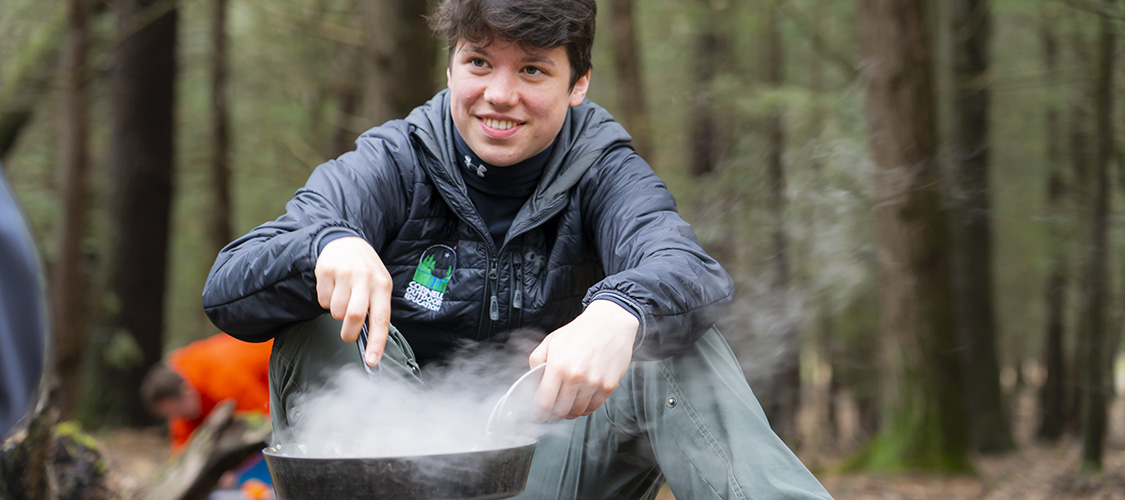PE 1601: Backcountry Cooking
Tired of only eating Ramen on trips? Do you wonder about the difference between powdered cheese and real cheese? Ever wanted to learn how to make true gourmet food in the field? This course will introduce students to gourmet skills that can be used in the backcountry, including the use of dutch ovens and twiggy fires.
| Course Fee | Students: $415 Community: $445 CU Faculty/Staff: $435 |
|---|---|
| Fee Notes | All group camping equipment and food is provided |
| Attendance | First class is mandatory. Students must attend all classes to receive PE credit. |
| Prerequisites | No previous experience. |
| Drop Deadline | 1/20/26 |
| Enrollment | Enroll through Student Center or by contacting COE at 607-255-6183 or coed@cornell.edu |
| Links | Medical Form |
| Day | Date | Time |
|---|---|---|
| Wednesday | 4/8/26 | 5pm to 7pm |
| Sunday | 4/12/26 | 9:00am to 3:00pm |
| Sunday | 4/19/26 | 9:00am to 3:00pm |
| Sat-Sun | 4/25/26 - 4/26/26 (Overnight) | 10:00am to 12:00pm |
Equipment List
Although this personal gear list is long, these items are necessary for health and safety during your trip.
* These items are provided by COE and are covered in the course fee.
** These items can be rented from the COE Outfitting. Prices below reflect 25% discount, tax not included.
Upper Body
- Synthetic, non-cotton t-shirt
- 1 long underwear top (polypropylene or wool, not cotton)
- 1 non-cotton insulating layer (ex. fleece jacket, wool sweater, pile vest, down vest)
- * 1 Rain Jacket or Poncho (must fit over all other layers and keep you dry)
Lower Body
- 1 pair synthetic long underwear
- synthetic athletic/hiking shorts
- 1 pair long pants or lower body shell, one of the following:
- * nylon wind pants
- loose fitting synthetic pants, tight weave, NO JEANS
- rain pants
- hiking pants
- underwear (cotton is fine here)
- 1 pair for each day of trip recommended
Head and Hands
- 1 warm hat, wool or synthetic
- 1 to 2 bandanas
- 1 pair wool/fleece mittens or gloves
- 1 sun hat, baseball hat is fine
Feet
- hiking socks (thick wool or synthetic, NOT cotton)
- 1 pair hiking boots, good ankle support and traction, comfortable and broken in! Do not plan on wearing brand new hiking boots for the first time on your trip!
- 1 pair camp shoes, soft shoes, warm; old sneakers work well (no open toed sandals or shoes with holes in them such as Tevas, Chacos, Crocs and Keens)
Personal Gear
- * Frame backpack to carry all personal gear and your share of group food and gear: internal or external - pretty big (3,000-5,000 cubic inches)
- * sleeping pad – closed cell ensolite or Therm-a-rest
- * sleeping bag & stuff sack (rated to at least 20 degrees F)
- 3 large heavy duty plastic bags; can be garbage bags (one for your sleeping bag, one to line your pack, and one to cover your pack in case of rain)
- A few Ziploc bags or stuff sacks for holding toiletries, clothing, other gear.
- 2 quart-size water bottles, sturdy; Nalgene is a good idea.
- Do NOT bring water bottles with attached straws or complex lids.
- 1 cup, mug, small bowl or sturdy container for eating. Should be able to hold liquids.
- 1 reusable spoon/spork
- * headlamp with extra batteries
Personal Essentials
- chapstick, sunblock, sunglasses
- toothbrush and toothpaste
- small towel
- contacts, solution, glasses
- medication (let instructors know)
- pads, tampons, menstrual cups, etc.
Optional
- 1 to 2 pairs liner socks, synthetic or wool and thin
- insect repellent (~30% DEET is good)
- * crazy creek camp chair

